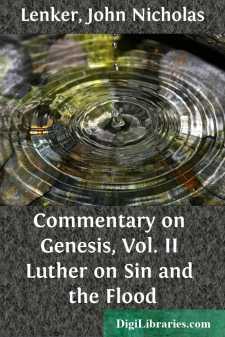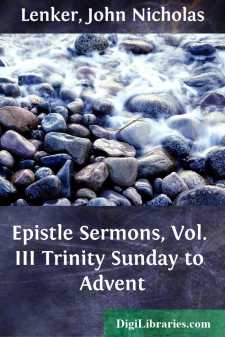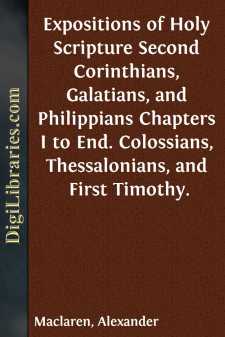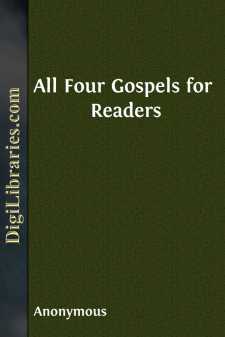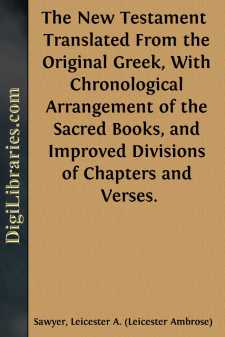Categories
- Antiques & Collectibles 13
- Architecture 36
- Art 48
- Bibles 22
- Biography & Autobiography 813
- Body, Mind & Spirit 142
- Business & Economics 28
- Children's Books 17
- Children's Fiction 14
- Computers 4
- Cooking 94
- Crafts & Hobbies 4
- Drama 346
- Education 46
- Family & Relationships 57
- Fiction 11829
- Games 19
- Gardening 17
- Health & Fitness 34
- History 1377
- House & Home 1
- Humor 147
- Juvenile Fiction 1873
- Juvenile Nonfiction 202
- Language Arts & Disciplines 88
- Law 16
- Literary Collections 686
- Literary Criticism 179
- Mathematics 13
- Medical 41
- Music 40
- Nature 179
- Non-Classifiable 1768
- Performing Arts 7
- Periodicals 1453
- Philosophy 64
- Photography 2
- Poetry 896
- Political Science 203
- Psychology 42
- Reference 154
- Religion 513
- Science 126
- Self-Help 84
- Social Science 81
- Sports & Recreation 34
- Study Aids 3
- Technology & Engineering 59
- Transportation 23
- Travel 463
- True Crime 29
Epistle Sermons, Vol. II Epiphany, Easter and Pentecost
Description:
Excerpt
Foreword
The Evangelization of the World is being accomplished more rapidly than we think. Three mighty movements are constantly at work—Reformation, Heathen Missions and Emigration or Colonization. By the Reformation Europe was evangelized; by Heathen Missions Asia and Africa are being evangelized and by Emigration or Colonization North and South America and Australia have been to a large extent evangelized. In "Lutherans In All Lands," published in 1893, and in the introduction to the volume on St. Peter's Epistles of the English Luther, we emphasized the relation of the Evangelical-Lutheran church and of Luther's writings to the evangelization of the world through these three movements. In view of the recent marvelous growth in interest in Heathen Missions and the false ideas about Luther's relation to this theme, the following may be in place here in this volume of Easter and Pentecost sermons:
The Christian religion being preëminently missionary the Reformation of the Christian Church would necessarily be missionary. Protestant missions began with Protestantism.
Herzog's Encyclopedia says: "Luther himself already seizes every opportunity offered by a text of the Divine Word in order to remind believers of the distress of the Heathen and Turks and earnestly urges them to pray in their behalf, and to send out missionaries to them. In accord with him all the prominent theologians and preachers of his day, and of the succeeding period inculcated the missionary duty of the Church. Many also of the Evangelical princes cherished the work with Christian love and zeal."
Luther's interest in the work of true evangelization is seen in the name he designedly chose for the church of his followers. He did not call it Protestant nor Lutheran, but conscientiously insisted upon it being called the Evangelical, or in plain Anglo-Saxon, the Gospel church, the Evangelizing church. Because of Luther's emphasis on the word evangelical there are properly speaking no Lutheran, but only Evangelical-Lutheran churches. He is the evangelist of Protestantism in the true sense.
Of the library of 110 volumes of which Luther is the author, 85 of them treat of the Bible and expound its pure evangelical teachings in commentaries, sermons and catechetical writings. He popularized the word evangelical. With his tongue and pen he labored incessantly for the evangelization of Europe. That Europe is evangelized is due more to his labors and writings than to those of any other. What those writings did for Europe they may do, and we believe, will do, for the world in a greater or less degree. The greatest evangelist of Europe has a God-given place in the evangelization of the world. His most evangelical classics should be translated into all the dialects of earth as soon as the Bible is given to the people in their native tongue.
Dr. Warneck says: "By the Reformation the christianizing of a large part of Europe was first completed, and so far it may be said to have carried on a mission work at home on an extensive scale." Further he says: "The Reformation certainly did a great indirect service to the cause of missions to the heathen, as it not only restored the true substance of missionary preaching by its earnest proclamation of the Gospel, but also brought back the whole work of missions on Apostolic lines....



